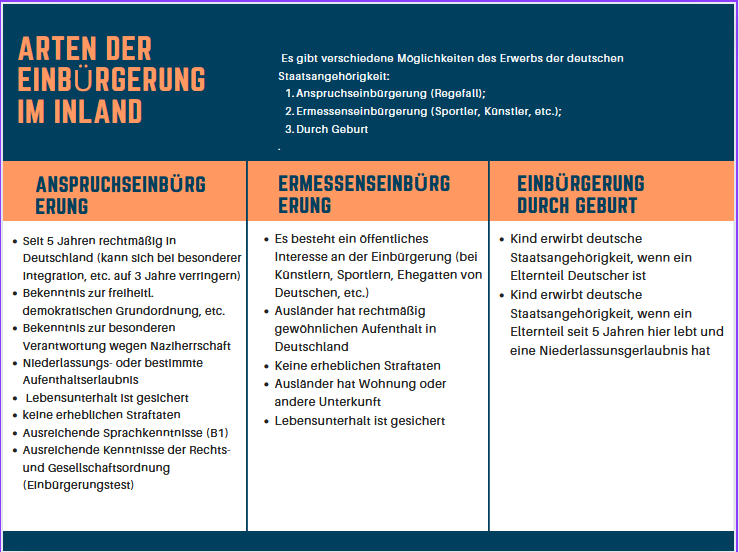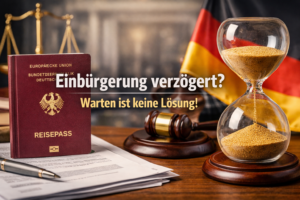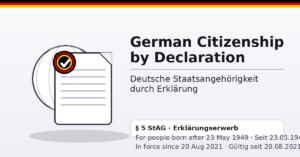Administrative Court of Stuttgart, February 21, 2017, Case No.: 11 K 5571/16
Naturalisation and the naturalisation procedure are regulated in the Citizenship Act (StAG). According to Section 10 Para. 1 StAG, a foreigner who has been legally resident in Germany for five years and is capable of acting in accordance with Section 37 Para. 1 Sentence 1 StAG or is legally represented is to be naturalised upon application, provided they fulfil the requirements specified in Section 10 StAG. In accordance with § 10 Para. 1 No. 5 StAG, the foreigner must not have been convicted of an unlawful offence, nor must he or she have been sentenced to a detention order due to his or her incapacity. According to § 12a Para. 1 StAG, the imposition of educational measures or correctional measures under the Juvenile Courts Act, convictions for fines of up to 90 daily rates and convictions for prison sentences of up to three months that have been suspended and remitted after the probation period has expired are not taken into account when assessing the sentence limit for naturalisation.
The following judgment addresses whether a rejection of naturalization due to various convictions must be disregarded in light of the public interest or due to particular hardship.
Facts of the Case:
The Plaintiff Seeks Naturalization into the German National Association
The plaintiff was born in 1979 in the Federal Republic of Germany as a Turkish national and received a permanent residence permit in 1995. Due to several criminal offenses, including negligent bodily harm, property damage, leaving the scene of an accident, and drunk driving, he was deported in 2003 and expelled to Turkey in 2004. Following a settlement before the Higher Administrative Court of Baden-Württemberg, the deportation was revoked, and he was granted a permanent residence permit. In 2007, he returned to Germany and was arrested to serve further sentences. He is married to a German national and received a settlement permit in 2007 and a permanent residence permit-EU in 2013.
The Authority Rejected Naturalization Due to Significant Criminal Offenses
On June 19, 2015, the plaintiff applied for naturalization in the German national association. The Federal Office of Justice indicated that his convictions would be eligible for deletion from May 1, 2020, if he remained free of further convictions. The District Office rejected the application by decision on May 27, 2016, because his convictions exceeded the threshold of § 12a paragraph 1 StAG. Discretionary naturalization was also not possible because the plaintiff did not meet the requirements of § 8 paragraph 1 No. 2 StAG, and there was neither a public interest nor particular hardship.
Plaintiff Argued Special Integration Achievements
On June 16, 2016, the plaintiff filed an appeal, arguing that he had made exceptional integration achievements since starting his family. He claimed to support his German family and was the only family member without German citizenship, which constituted particular hardship. He asserted that he had fundamentally changed his life since the convictions, completed a qualified vocational training program, and now worked as a car appraiser.
The Stuttgart Regional Council rejected the appeal on August 5, 2016, because the convictions could not be disregarded under § 12a paragraph 1 StAG. Discretionary naturalization was also excluded because there was neither a public interest nor particular hardship.
Decision of the Administrative Court of Stuttgart
The Administrative Court of Stuttgart ruled that the lawsuit was admissible but unfounded. The decision was lawful and did not violate the plaintiff’s rights. The plaintiff had no right to a reconsideration of his naturalization application.
The Plaintiff’s Criminal Offenses Were an Obstacle to Naturalization
The plaintiff did not meet the requirements of § 10 StAG because § 10 paragraph 1 sentence 1 No. 5 StAG precluded this. According to this provision, a naturalization applicant must not have been convicted of a criminal offense unless the conviction can be disregarded due to certain exceptions. However, the threshold of three months was significantly exceeded because the plaintiff was sentenced to more than 21 months of imprisonment in total.
Naturalization under § 9 paragraph 1 in conjunction with § 8 paragraph 2 StAG was also excluded because neither a public interest nor particular hardship was present.
Neither Particular Hardship Nor Public Interest Was Present
There was no public interest in naturalization because there was no state interest that differed from the average naturalization case. Even the plaintiff’s good integration, his marriage to a German national, and their children did not change this.
Particular hardship was also rejected. This requires a specific, atypical situation that particularly burdens the plaintiff. The exception in § 8 paragraph 2 StAG is intended to address hardships that would result from the denial of naturalization and that could be resolved or significantly mitigated by naturalization.
Even the fact that the plaintiff’s family members were German citizens did not constitute particular hardship. Furthermore, the constitutional protection of the family under Article 6 paragraph 1 of the Basic Law (GG) did not require a deviation from the requirements of § 8 paragraph 1 No. 2 StAG. In particular, the plaintiff was not at risk of negative effects on the family life, and there was a concrete prospect of naturalization after the convictions were eligible for deletion.
The lawsuit was therefore dismissed.

Source: Administrative Court Stuttgart
Important Note: The content of this article has been prepared to the best of our knowledge and belief. However, due to the complexity and constant evolution of the subject matter, we must exclude liability and warranty. Important Notice: The content of this article has been created to the best of our knowledge and understanding. However, due to the complexity and constant changes in the subject matter, we must exclude any liability and warranty.
If you need legal advice, please feel free to call us at 0221 - 80187670 or send us an email to info@mth-partner.de
Lawyers in Cologne advise and represent clients nationwide in immigration law.




